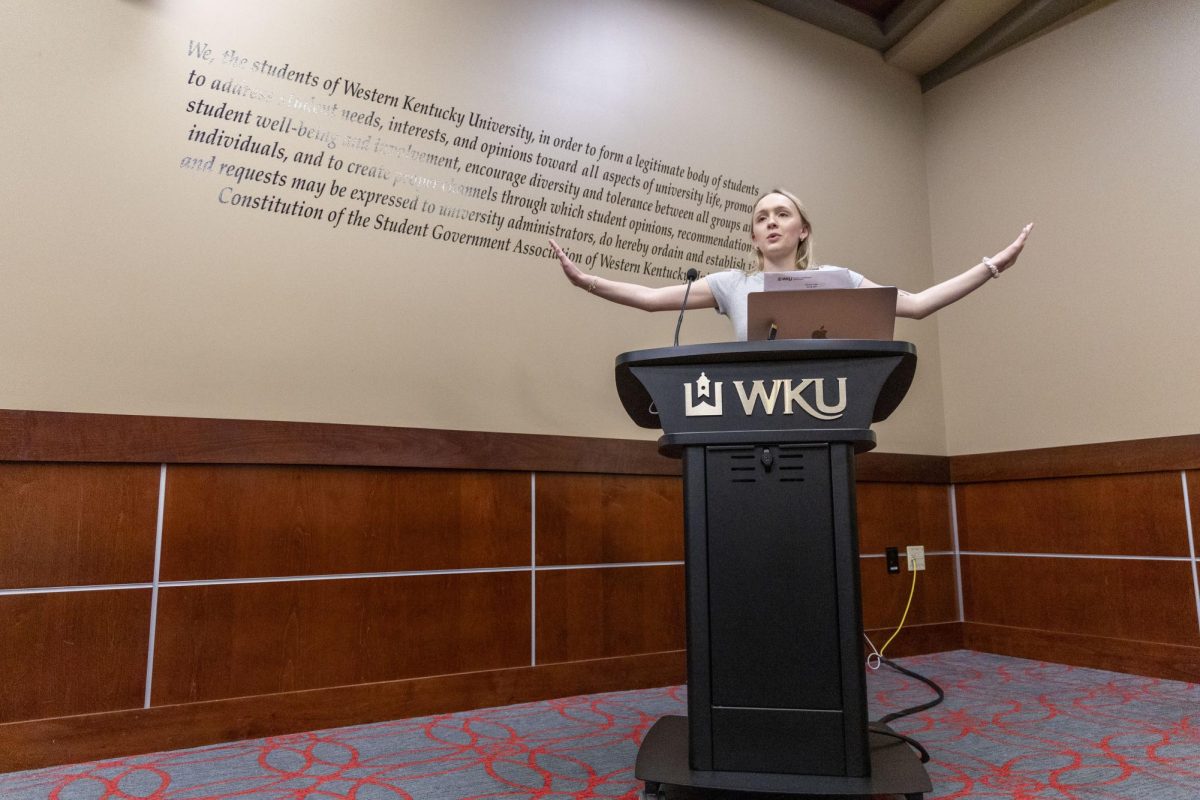WKU committee issues NDAs to its members raising questions of legality
The Naming and Symbols Task Force had its members sign non-disclosure agreements regarding the information being discussed.
November 15, 2021
The Bowling Green Daily News reported in July that the Naming and Symbols Task Force issued NDAs to its members last year, which raises the question: why is a public university committee discussing public matters signing NDAs?
Task force members, appointed by President Timothy Caboni, made recommendations to the university on whether the names of Ogden, Potter, Van Meter and Kelly Thompson Halls should be changed due to their controversial ties to slavery and segregation.
The recommendations for the university published by the committee stated “it is essential that WKU educates the campus and local communities, as well as our alumni, about the names that are memorialized on our campus.”
The Open Meetings Act, enacted in Kentucky in 1974, established a right of access to public meetings. The General Assembly recognized that public policy should be public knowledge. The act requires that any meeting of a public agency where public policy is discussed must take place in a publicly-accessible setting. The act also applies when action is taken on a public issue.
The Open Meetings Act considers “every state or local government agency, including the policy-making board of an institution of education,” a public agency.
The Open Meetings Act includes “any board, commission, committee, subcommittee, ad hoc committee, advisory committee, council, or agency […] established, created, and controlled by a ‘public agency’.”
Non-disclosure agreements are typically used for the protection of intellectual property, trade secrets and other sensitive information within corporations, said Jon Fleischaker, Kaplan Johnson Abate & Bird attorney and one of the primary authors of the Open Records and Open Meetings Acts.
Fleischaker said NDAs have no place in a public university.
“The public has a right to know and the students have a right to know what is going on at their university and how decisions are being made,” Fleischaker said.
Michael Abate, Kaplan Johnson Abate & Bird attorney who represents the Herald, said that while there are valid reasons for a university to issue NDAs, like when discussing sensitive medical research or trade secrets, hiding information that should be public is in violation of the Open Meetings Act.
“It’s hard to see what could be validly kept confidential there,” Abate said. “You can’t just make someone sign an NDA and take something that is otherwise public business or public record and put it behind a wall of secrecy.”
The Naming and Symbols Task Force is not the only example of WKU committees signing NDAs.
Caboni created a Title IX committee in 2018 to review the Office of Equal Employment Opportunity, the Title IX Office and the Office of Student Conduct after reports of a former SGA president experiencing harassment on campus.
The Bowling Green Daily News reported in 2018 that members of the Title IX committee signed confidentiality agreements and could not disclose information on what was being discussed in their meetings.
Former assistant attorney general Amie Bensenhaver considers the Naming and Symbols Task Force an advisory committee, which falls under the definition of a public agency under the Open Meetings Act.
“There is a statutorily recognized right to know how public policy is being formed, how decisions are being made and what conversations are taking place,” Bensenhaver said. “The formation of public policy is public business.”
Bensenhaver said a public committee needs a legal basis in order to have a closed meeting.
“Either you have a legal basis for [a closed meeting] or you don’t,” Bensenhaver said. “If you have a legal basis for it, you don’t need to have an NDA to back it up. But you can’t prompt an NDA without a legal basis.”
Bensenhaver said she doesn’t understand the need for secrecy within the task force.
“It’s a sensitive issue. I get it,” Bensenhaver said. “But sensitivity is not an exception to the Open Meetings Law.”
Bensenhaver said she dealt with many of these kinds of issues within businesses during her time as assistant attorney general.
“You cannot contract away the public’s right to know,” Bensenhaver said.
Fleischaker said the issuing of NDAs is antithetical to the claim of being a transparent institution.
“Transparency is injurious to the university to carry out its function of education and discussion,” Fleischaker said.
According to Fleischaker, NDAs were originally used primarily within private corporations when proprietary information or trade secrets were being discussed.
“That has very little to do with the operation of a public university,” Fleischaker said. “So it’s very questionable if they should be there in the first place.”
Fleischaker said he has noticed more and more situations where NDAs are being issued within matters that violate the Open Meetings Act, including in public universities.
A case involving the Courier-Journal and the University of Louisville was brought to the Supreme Court in 2005 after the publication requested documents detailing donations to the University of Louisville Foundation from private individuals.
The University of Louisville Foundation refused to turn over these documents, claiming that they were exempt from the Open Records Act. The court ruled in favor of the newspaper.
The Herald recently requested copies of all NDAs that have been issued to WKU faculty, staff, or students within the past five years on Aug. 30, 2021. The Herald received an example copy of a typical university NDA.
Jace Lux, director of WKU’s media relations, said the NDAs were developed by the Naming and Symbols Task Force itself.
“That wasn’t anything that the university imposed on them,” Lux said. “They felt that it would allow them to express their ideas without any sort of external pressure.”
Lux said this isn’t an unusual practice for universities.
“Non-disclosure agreements are extremely common in not just university settings, but in business settings,” Lux said. “Especially if they’re discussing items that members feel could be decisive or controversial.”
He said this isn’t unique to committees within WKU.
Lux said the Naming and Symbols Task Force was only making recommendations and not setting policy, therefore was not subject to the Open Meetings Act. He said a committee like the Board of Regents, for example, is subject to the law.
Projects Editor Jacob Latimer can be reached at jacob.latimer745@topper. wku.edu. Follow him on Twitter @jacoblatimer_.













